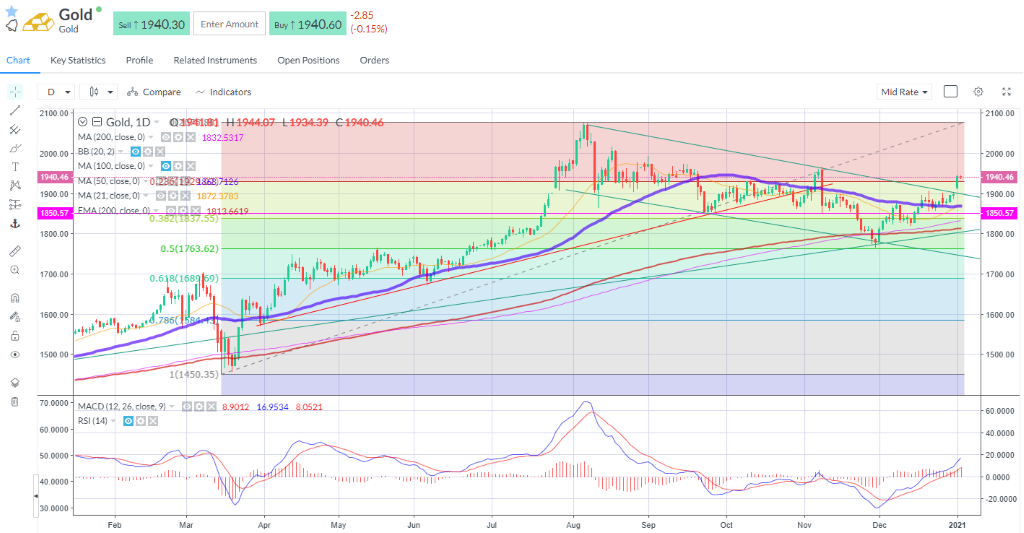European stock markets chopped around the flatline early on Tuesday as investors sought direction following heavy selling on Wall Street and broader concerns about rising coronavirus cases and the impact these will have on the global economic recovery. Sterling retreated from its strongest in almost three years against the dollar as the UK enters its third lockdown, which will be reviewed in mid-February.
Wall Street indices hit record highs but retreated sharply in a wild session that saw the Dow and S&P 500 suffer their biggest declines since Oct 28th. Yesterday, the S&P 500 declined 1.5% but just was off the lows and held on to 3,700 at the close after dropping as low as 3,662. The Dow Jones fell almost 400pts but was about 350pts off its lows of the day by the close. Whilst it was a tough start to the year on Wall Street, rejection of the lows is a positive sign that there is not much appetite to fight the Fed. The Georgia runoffs today will be crucial for the bond market and we should start to get an idea from midnight tonight. Currently, latest polls indicate the Democrats could take both seats and end the GOP’s Senate Dominance.
Today, the FTSE 100 opened down but quickly turned higher, lifted by the likes of Shell and BP, which both rose around 2-3% in the first part of the session. Reopening stocks struggled at the open before paring losses. Although there is a lot of noise around this lockdown in the UK, the long-term narrative remains tentatively optimistic about vaccines allowing a return to relative normality by the spring. Whilst those of with children in school are disappointed that they are being asked to shoulder any of the burden, let alone see their lives upended again, the market is relatively comfortable with the fact Q1 is going to be tough.
Shares in China Telecom, China Unicom and China Mobile all rose sharply after the NYSE backtracked on plans to delist the companies. Could this be a sign of a more emollient Biden regime? It won’t harm US-China relations. The China-Europe investment deal is also boosting sentiment in Chinese markets. Stocks in China also rose broadly on hopes that Beijing will continue to deliver greater policy support
Next always likes to under-promise and over-deliver. Shares surged 8% in early trade today, hitting the best level in 5 years, after the company reported a far stronger Christmas trading period than it had guided for back in October; something investors should be used to. Full prices shares in the nine weeks to Boxing Day declined 1.1% from a year before, vs the -8% guided at the last update. Having hiked the full-year profit guidance to £365m in October, from the £300m guided in September, management is able to say full-year profit before tax will be £370m this year. Next’s shift to online is really the blueprint for any retailer. Even with a collapse in the high street, it can consistently deliver free cash flow. The pandemic has proved more challenging – suspending buybacks and dividends, and selling off assets have been required to shore up the balance sheet this year. But it remains a resilient company able to generate pre-tax profit on a consistent basis.
The OPEC+ meeting continues today after the 23 nations in the cartel and allied group failed to reach agreement on production levels for February. Russia is pushing for an increase of 500k bpd next month, but Saudi Arabia is warning that this is too soon, and the market remains fragile. The Saudis don’t want to gamble price stability for a few thousand extra barrels, but it is clear unity is a problem and they cannot assume they can take everyone with them for much longer. Prices were volatile with Brent swinging around a range of $53-$51 and WTI moving up close to $50 before finding support at $47.
Gold prices checked after hitting fresh highs after breaking the recent downtrend and securing the move above the 23.6% retracement at $1,929. – momentum still looking positive. US real rates dropped further as breakeven inflation expectations topped 2%.

Risk Warning: this article represents only the author’s views and is for reference only. It does not constitute investment advice or financial guidance, nor does it represent the stance of the Markets.com platform.When considering shares, indices, forex (foreign exchange) and commodities for trading and price predictions, remember that trading CFDs involves a significant degree of risk and could result in capital loss.Past performance is not indicative of any future results. This information is provided for informative purposes only and should not be construed to be investment advice. Trading cryptocurrency CFDs and spread bets is restricted for all UK retail clients.